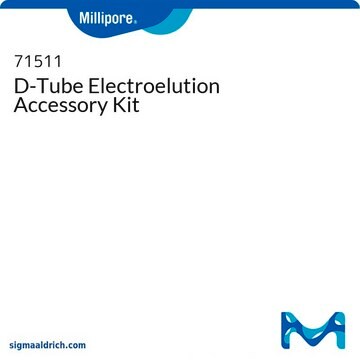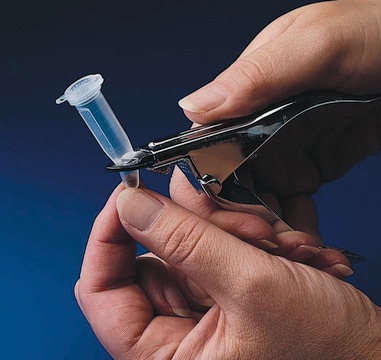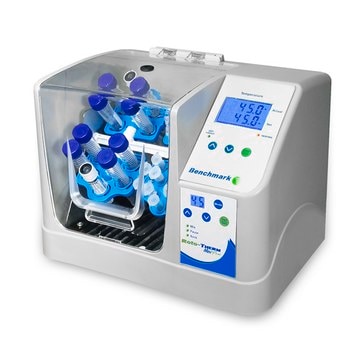Z742613
G-CAPSULE™ electroelution device
Synonym(s):
electroelution tool, rapid recovery of PCR products
Sign Into View Organizational & Contract Pricing
All Photos(4)
About This Item
UNSPSC Code:
41123100
NACRES:
NC.02
Recommended Products
packaging
pkg of 55 ea
manufacturer/tradename
G-BioSciences 786-001
General description
G-CAPSULE™ is an electroelution tool for rapid recovery of PCR products, DNA fragments and proteins from agarose and polyacrylamide gels. G-CAPSULE™ consists of two main parts, G-CAPSULE™ for picking DNA or protein band from the gel, and G-CAPSULE™ , which traps the migrating DNA or protein during electroelution. After excising the DNA or protein band from the gel with G-CAPSULE™ , the G-CAPSULE™ assembly is then placed in a gel box and a current applied. Under the influence of an electrical field, DNA and protein molecules migrate toward the positive (+) terminal of the electrophoresis apparatus and captured by the G-CAPSULE™ and become bound to the membrane.
Legal Information
G-Capsule is a trademark of Geno Technology, Inc.
related product
Product No.
Description
Pricing
Certificates of Analysis (COA)
Search for Certificates of Analysis (COA) by entering the products Lot/Batch Number. Lot and Batch Numbers can be found on a product’s label following the words ‘Lot’ or ‘Batch’.
Already Own This Product?
Find documentation for the products that you have recently purchased in the Document Library.
Customers Also Viewed
H J Kim et al.
European journal of obstetrics, gynecology, and reproductive biology, 98(2), 213-218 (2001-09-28)
Inactivation of p53, either through mutation or interaction with human papillomavirus (HPV) E6 oncoprotein, is a characteristic feature of cervical carcinoma cell lines that have been previously studied. To elucidate the role of p53 in the carcinogenesis of Korean cervical
M E Robu et al.
Proceedings of the National Academy of Sciences of the United States of America, 98(15), 8211-8218 (2001-07-19)
Replication forks are halted by many types of DNA damage. At the site of a leading-strand DNA lesion, forks may stall and leave the lesion in a single-strand gap. Fork regression is the first step in several proposed pathways that
J M Crosslin et al.
Virus research, 96(1-2), 99-105 (2003-09-03)
Sequence analysis of RNA 2 of four Tobacco rattle virus (TRV) isolates collected from potato fields in Oregon (OR2, Umt1), Washington (BM), and Colorado (Cot2) revealed significant homologies to the ORY isolate from North America. Phylogenetic analysis based on a
S Braschi et al.
Biochimica et biophysica acta, 1392(2-3), 276-290 (1998-06-19)
Transgenic mice were created overproducing a range of human HL (hHL) activities (4-23-fold increase) to further examine the role of hepatic lipase (HL) in lipoprotein metabolism. A 5-fold increase in heparin releasable HL activity was accompanied by moderate (approx. 20%)
Sirshendu Chatterjee et al.
Acta biochimica et biophysica Sinica, 44(3), 259-268 (2012-01-20)
Sheep red blood cell (SRBC), a non-specific biological response modifier that has long been used as a classical antigen, has been shown to exert an immunomodulatory and anti-tumor activities in experimental animals. The active component of SRBC, which is responsible
Our team of scientists has experience in all areas of research including Life Science, Material Science, Chemical Synthesis, Chromatography, Analytical and many others.
Contact Technical Service








